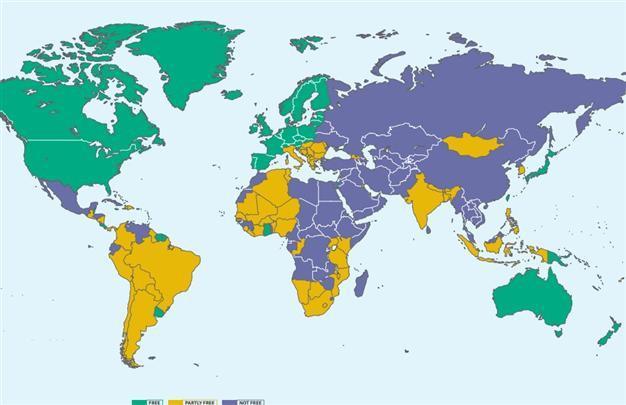Turkey no longer even 'partly free,' according to press freedom report
Tolga Tanış - Washington
 Turkey has been relegated from the league of “Partly Free” countries to the league of “Not Free” countries, according to the latest report from U.S. think tank Freedom House.
Turkey has been relegated from the league of “Partly Free” countries to the league of “Not Free” countries, according to the latest report from U.S. think tank Freedom House.The report, titled “Freedom of the Press 2014,” concludes that global press freedom fell to its lowest level in over a decade in 2013, as hopes raised by the Arab Spring were further dashed by major regression in Egypt, Libya, and Jordan, and marked setbacks also occurred in Turkey, Ukraine, and a number of countries in East Africa.
Citing the desire of governments, especially authoritarian ones, to control news content as the main reason for the regression, the report suggested that there were positive developments in a number of countries, most notably in sub-Saharan Africa but that the dominant trends were reflected in setbacks in a range of settings. Turkey, which was 117th in last year’s report, fell to 134th place.
Libya, South Sudan, Ukraine, and Zambia also saw their statuses downgraded for 2013, while significant declines occurred in the Central African Republic, Egypt, Greece, Jordan, Kenya, Montenegro, Mozambique, Tanzania and Uganda.
“The region’s [Europe] largest numerical change occurred in Turkey, which declined from 56 to 62 points and moved from Partly Free to Not Free. Constitutional guarantees of freedom of the press and expression are only partially upheld in practice, undermined by restrictive provisions in the criminal code and the Anti-Terrorism Act. Turkey remained the world’s leading jailer of journalists in 2013, with 40 behind bars as of Dec. 1, according to the Committee to Protect Journalists,” the report said.
Freedom House stressed that journalists were harassed while covering the Gezi Park protests and dozens were fired or forced to resign due to their coverage of sensitive issues like negotiations between the Turkish government and the outlawed Kurdistan Workers’ Party (PKK).
“The firings highlighted the close relationship between the government and many media owners, and the formal and informal pressure that this places on journalists,” the report added.
Click here to read the full report.
















